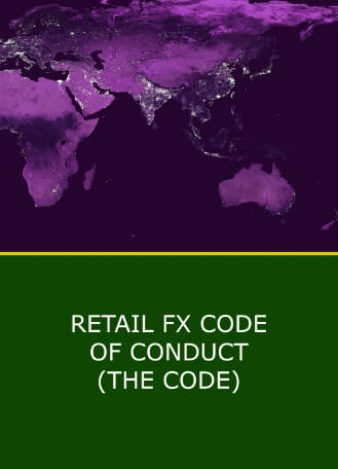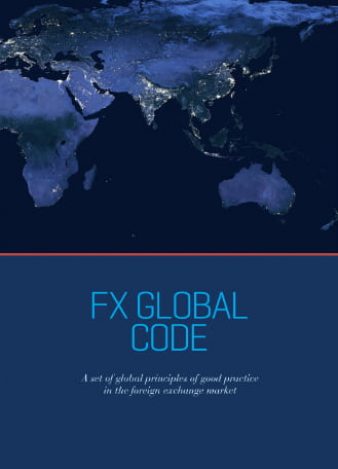RETAIL FX CODE OF CONDUCT
The aim and purpose of the Code is to provide recommended standards and to establish a set of best practices for Market Participants when engaging in Foreign Exchange transactions with the general retail public and in addressing any client-related matters.
For the purposes of the Code, a ‘Retail Client’ is defined as any company, organization or entity that routinely transacts FX conversions of amounts not exceeding USD One Hundred Thousand Dollars (USD100,000.00) or its equivalent in any other currency. All transactions for individuals irrespective of value would also be deemed as Retail.
Irrespective of their role, Market Participants when handling orders should:
- have clear standards in place that strive for a fair and transparent outcome for the Retail Client;
- have clear standards in place for the governance of FX Market activity
- be truthful in their statements;
- use clear and unambiguous language;
- make clear whether the prices they are providing are firm or merely indicative.
- make disclosures of terms and conditions and fees and charges that are applicable in the foreign exchange transaction; and
- establish and implement such structures, policies, procedures, controls, resources and training, as may be necessary to ensure their own compliance with the Code.
All Market Participants share a common interest in maintaining the highest degree of professionalism and the highest standards of business conduct in the FX Market.
High standards of conduct are underpinned by:
- having sufficient knowledge of, and complying with, Applicable Law;
- having sufficient relevant experience, technical knowledge, and qualifications;
- acting with competence and skill;
- applying professional judgement in following the Market Participant’s guidelines and operating procedures, including, but not limited to, methods of execution, record keeping, and ethical behaviour;
- engaging in efforts to strive for the highest standards of professionalism in the wider FX Market.
Market Participants should have personnel who are appropriately trained and who have the necessary experience to discharge their employment duties in a professional manner.
Market Participants should also:
- act honestly in dealings with Retail Clients and other Market Participants;
- act fairly, in a consistent and appropriately transparent manner in dealing with Retail Clients and other Market Participants; and
- act with integrity, particularly in avoiding and confronting questionable practices and behaviour.
No Market Participant having access to information on Retail Clients’ records, correspondence or material with regard to the account of any Retail Client; shall give, divulge or reveal any information regarding the transactions or other relevant particulars of the account of that Retail Client to any other person, except where required under Applicable Law.
Market Participants should:
- establish and implement procedures for handling customer complaints;
- designate one or more officers of the business as responsible officers specifically charged with the responsibility for handling customers’ complaints. These officers shall also be the designated points of contact for customer complaints;
- provide confidential channels for clients to escalate concerns about potentially improper practices and behaviours;
- Investigate complaints and respond in writing to the complainant in the manner and within the time period specified below- (a) acknowledgement of receipt of the complaint within a period not exceeding five business days from the date of the receipt of the complaint. The acknowledgment should state an indicative period within which an initial response to the complainant on the progress of the investigation will be provided; and (b) response outlining the final decision within a period not exceeding forty-five business days of the receipt of the complaint, and further ensure that where- (i) the complaint is upheld, in whole or in part, this response includes a description of the action taken or to be taken to remedy the situation; (ii) the complaint is rejected, in whole or in part, a reason for the rejection of the complaint is also provided in the response.
In relation to a complaint for which a final decision cannot be reached within the period specified, Bank of Jamaica will have the final opinion on the matter.
Market Participants are required to comply with all regulatory obligations under POCA, TPA and the Bank of Jamaica Guidance Notes. Market Participants’ internal KYC/AML/CFT policies and procedures should be consistent with all statutory and regulatory requirements.
These should include:
- robust controls in place to enforce the KYC/AML/CFT principles;
- a clear understanding of all Applicable Law and regulations on the prevention of money laundering and terrorist financing;
- internal processes in place to facilitate the identification and prompt reporting of suspicious activities;
- effective and regular training for relevant personnel, to raise awareness of the serious nature of these activities, and reporting obligations; and
- periodic independent reviews by subject experts
- Market Participants should confirm FX trades as soon as practicable after execution, amendment or cancellation. The use of automated trade confirmation matching systems, when available, is strongly recommended. Market Participants should also implement operating practices that segregate responsibility for trade confirmation and trade execution.
- Confirmation should be transmitted in a secure manner; Electronic and automated confirmations are encouraged.
- If confirmations are communicated via open communication methods, those methods should comply with established information security standards, such as encryption in order to reduce the risk of fraudulent interception,
- Email communication received from a Market Participant’s known email account will be deemed as originating from that Market Participant; any variation from discussions should be followed up by a call.
- Market Participants should ensure that they maintain procedures to minimize trade discrepancies.
- Market Participants that identify discrepancies between received confirmations or alleged trades and their own trade records should investigate internally and inform their counterpart with the aim to resolve such discrepancies as soon as practicable. Market Participants should also carefully reconcile all alleged trades and inform senders of unknown confirmations that the recipient cannot allocate to any internal trade record.
- All Market Participants are to ensure that escalation procedures are established to resolve any unconfirmed or disputed terms as a matter of urgency, and processes should be in place to detect and report adverse trends that emerge in the discrepancies.
- Escalation procedures should include notification to trading and other relevant internal parties so that they know which counterparties may have practices that do not align with best practices regarding confirmation of trades.
Failure to comply with the Retail Code of Conduct may result in Authorised Dealers losing the authorization under the Bank of Jamaica (Authorized Dealers) Order 2015. For cambios, failure to comply will also be guided by Section I of the Operating Directions issued by Bank of Jamaica. In addition, Authorized dealers and cambios may be excluded from B-FXITT operations.
Glossary of Terms
Anti-Money Laundering Countering the Financing of Terrorism (AML/CFT) Policies and Procedures: This refers to a set of internal procedures and policies. These policies and procedures must at a minimum be based on applicable laws and regulations of Jamaica and Bank of Jamaica Guidance Notes designed to stop the practice of generating income through illegal activities.
Applicable Law: With respect to a Market Participant, the laws, rules, and regulations applicable to it and the FX Market in each jurisdiction in which it does business.
Confidential Information: Information that is to be treated as confidential, including FX Trading Information and Designated Confidential Information.
Foreign Exchange transactions: transactions between any Market participant and its clients that involves the exchange of any two currencies.
FX: Foreign exchange.
FX Market: The foreign exchange market.
Know Your Customer (KYC) Policies and Procedures: This refers to a set of internal procedures and policies. These policies and procedures must at a minimum be based on applicable laws and regulations of Jamaica designed to ensure that market participants know their clients by carrying out the required due diligence activities and verification of identity.
Market Participant: An authorized dealer or an exchange bureau (cambio) so designated under Section 22B of the Bank of Jamaica Act which is engaged in the activity of the purchase or sale of one currency against another, or in transactions designed to result in gains or losses based upon the change in one or more FX rates, such as derivatives, whether deliverable or non-deliverable, either directly or indirectly through other Market Participants. The term includes any personnel who is employed to a Market Participant and conducts transactions on behalf of said Market Participant.
POCA: Proceeds of Crime Act (2007) (Amended 2013)
Retail Client: Any company, organization or entity that routinely transacts FX conversions of amounts not exceeding USD One Hundred Thousand Dollars (USD100, 000.00) or its equivalent in any other currency. All transactions for individuals irrespective of value would also be deemed as Retail.
Retail FX Code: A set of principles of good practices in the retail foreign exchange market.
TPA: Terrorism Prevention Act (2005) (Amended October 2013)



